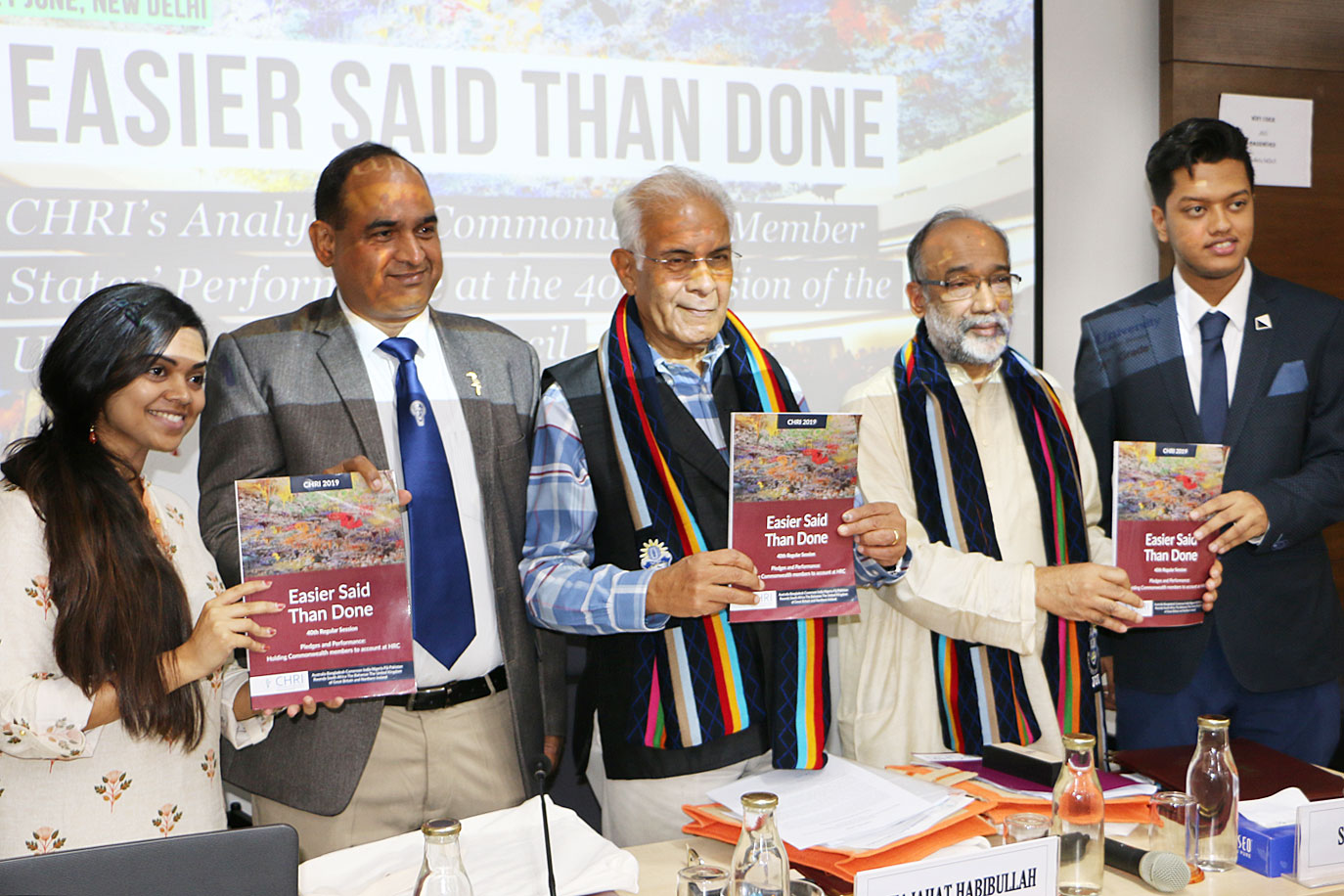Experts, HRDs discuss India’s, UN HRC member states’ performance at launch of CHRI ‘Easier Said Than Done’ report

New Delhi, 21 June: Diplomats, senior former officials from the Ministry of External Affairs (MEA), academics, activists and human rights defenders today took part in a lively discussion on how UN Human Rights Council (HRC) member states performed on the ground in contrast to their pledges, at the launch of CHRI’s flagship report ‘Easier Said Than Done’ (ESTD).
The ESTD report was released in collaboration with the Centre for Human Rights Studies of the O.P. Jindal University in New Delhi. This is the 11th year of the ESTD series, which assess the compliance of Commonwealth members towards their human rights obligations and recommend changes in process and capacity.
Endorsing the report , Professor Sudarshan Ramaswamy, Executive Director of the Centre for Global Governance and Policy at the O.P. Jindal Global University, said, “Reports such as these are welcome, we need many more of them and we need to educate more people about the UN, its mechanisms and the obligations that countries have.”
Mr. Sanjoy Hazarika, CHRI International Director said, “Our work with, on and about the UN Human Rights Council is based around the need to demystify the HRC and bring it home, back to the public spaces where it belongs, to reach and debate and help concerned groups provide inputs on a critical issue — the role of human rights in foreign policy formation.” You can read his opening remarks here.
The launch was followed by panel discussions which looked at the report’s findings on the compliance of the 11 Commonwealth member countries with their pledges at the UNHRC, and critiquing India’s performance at the Council in detail.
The speakers, who addressed a packed room of around 60 people, included H.E. Mr. Yogesh Punja, High Commissioner of Fiji; Mr. TCA Rangachari (IFS, retd.), former Amabassador to Algeria, France, Germany and India’s Permanent Mission to the UN New York; Mr. Paul Divakar, General Secretary, National Campaign of Dalit Human Rights (NCDHR); and Mr. Jaimini Kumar Srivastava, Deputy Director, Media and Communication, National Human Rights Commission (NHRC), among others.
Commenting on the ‘vagueness’ that often creeps into India’s voluntary pledges to the Council, Professor YSR Murthy, Registrar and Executive Director, Centre for Human Rights Studies at the O.P. Jindal Global University, suggested that the country needed to more comprehensive measures to ensure it followed through on its human rights promises. To this, Mr. Ranganathan said that India could only ensure rights for all citizens through domestic action and legislation, instead of looking outwards to international bodies.
In the audience were Mr. Muchkund Dubey, former Ambassador and former Indian Foreign Secretary; Ms. Yukiko Koyama, Senior Protection Officer, UNHCR India; Mr. Jawad Ali, Counsellor, High Commission of Pakistan to India; Mr. Micyo Rutishisha, Second Counsellor, Rwandan High Commission, Ms. Pallavi Nayek, Direct Aid Program Administrator with the Australian High Commission, and Ms. Friederike Tschampa, a representative from the EU.
This edition looks at the performance of 11 countries at the 40th session of the HRC: Australia, The Bahamas, Bangladesh, Cameroon, Fiji, India, Nigeria, Pakistan, Rwanda, South Africa, and the United Kingdom of Great Britain and Northern Ireland (UK). The 40th regular session was held at the United Nations Office in Geneva from 25 February to 22 March 2019.
This is the first-ever launch of the report in India; previous editions of the ESTD were on the margins of UNHRC sessions in Geneva.
***
You can read the full report here. For more information, please contact Aditi Patil at aditipatil@humanrightsinitiative.org.